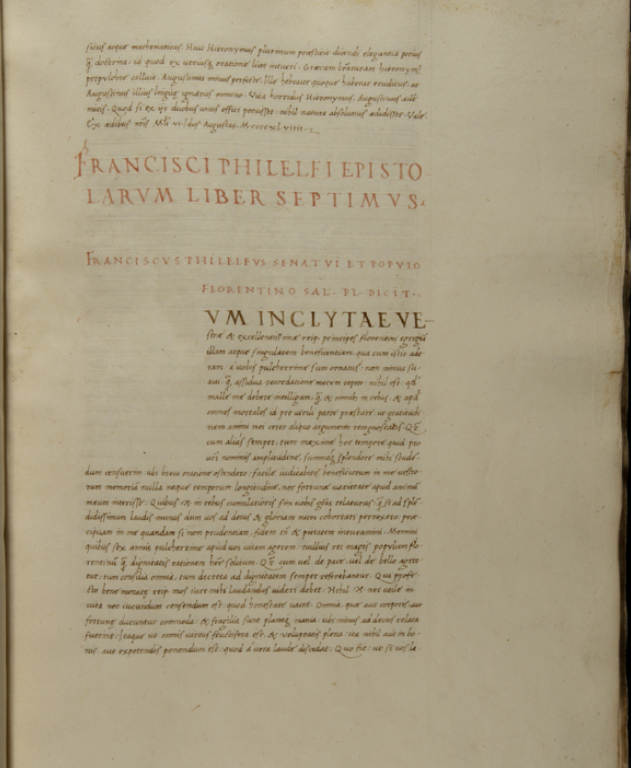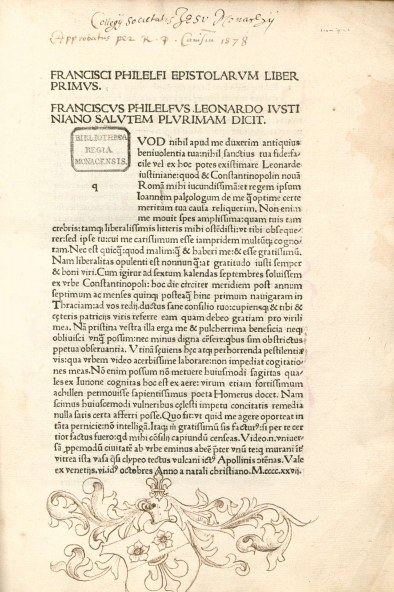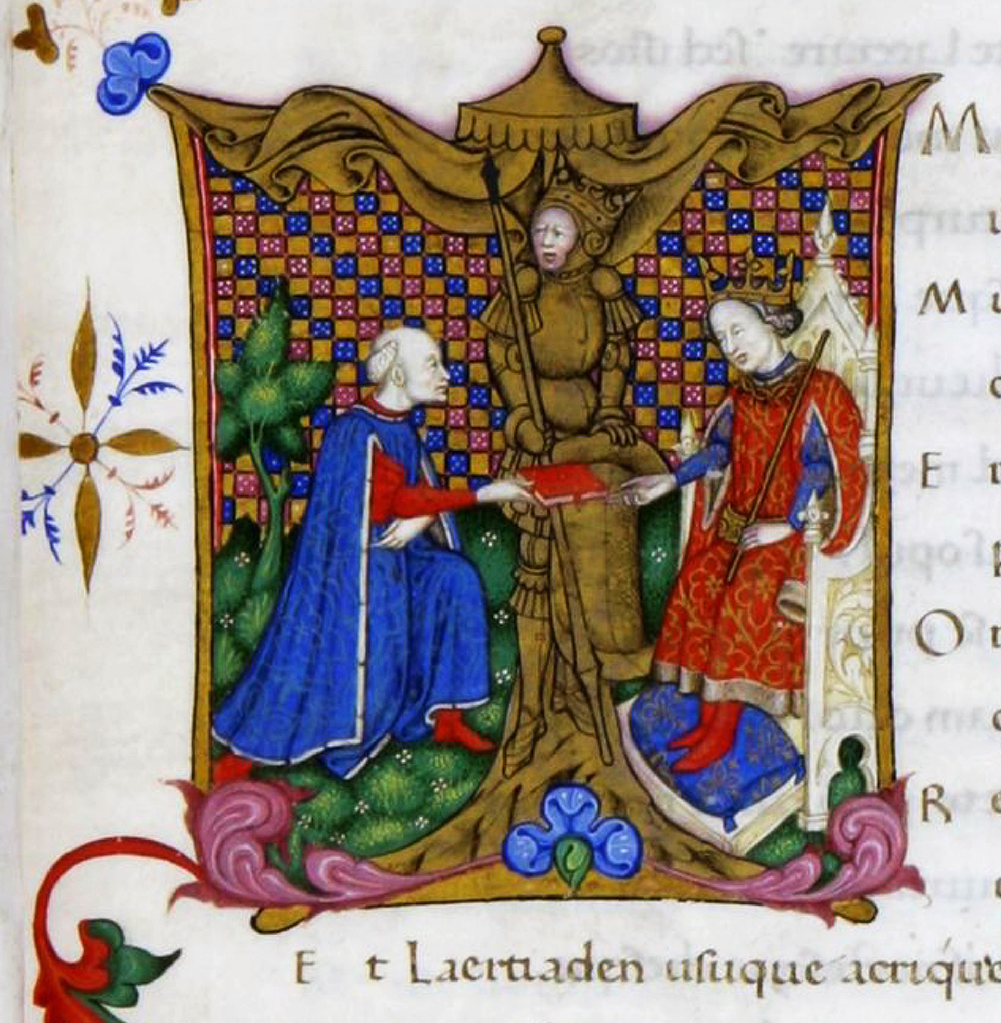Purpose, History, Prospects

Humanism is a term that has regained great relevance, even in political discourse, as it effectively expresses the idea of synthesis between a sense of tradition and the need for renewal: these have indeed been the constitutive demands of the most authentic stages of civil progress. However, the common use of the term does not always entail a full awareness of the phenomenon, in its historical and cultural dimension, whose profound significance was able to transcend, within a limited time, the boundaries of the centuries in which it was expressed. The Philelfiana project – named after Francesco Filelfo, a central figure in the European context of the fifteenth-century Renaissance – promotes and supports philological, linguistic, literary, and codicological research in this field. It does so by valorizing the systems of relationship between East and West that, in the vast process of translatio studiorum, manifested precisely on these fronts, and by providing for their dissemination on a large scale (particularly involving schools), also in compliance with the university’s third mission.
Philelfiana was born with national funding FIRB 2012 (RBFR12EYFD) for the research Oriente e Occidente nell’Umanesimo europeo: la biblioteca e le lettere di Francesco Filelfo (1398-1481). Ricostruzione e catalogazione della collezione libraria, edizione dell’epistolario, repertorio lessicografico, filologico e storico-bibliografico online della corrispondenza latina, greca e volgare, coordinated by Silvia Fiaschi (PI). The extensive program, formally concluded in 2016, was joined by the University of Macerata (central unit), the University of Milan (coordinated by David Speranzi), the University of Pisa (coordinated by Paolo Pontari), the University of Venice (coordinated by Filippo Bognini); partners included the University of Pavia, the National Institute of Renaissance Studies in Florence, and the Municipal Library “Filelfica” of Tolentino. The main fields of investigation addressed by the project – partly the subject of numerous and significant results already achieved, partly of current lines of development – are the vast correspondence (Greek, Latin, and vernacular) of the humanist, the publication of works so far unpublished or lacking satisfactory editions on the philological and exegetical level, the reconstruction of his library of extraordinary and singular importance. The working methods are characterized by an interdisciplinary approach: the most significant novelties emerge from an appropriate interrelation between philology, literature, codicology, paleography, history, and art history, which contribute to delineating an increasingly detailed picture of the intellectual from Tolentino and, consequently, of an important section of Italian Humanism and the early European Renaissance.
Francesco Filelfo’s Library

One of the crucial aspects of the activities involves identifying the manuscripts belonging to the rich Filelfian library, which, as is known, was dispersed among various conservation sites upon the humanist’s death; the Medicea Laurenziana Library is undoubtedly the one currently preserving the largest nucleus, particularly concerning the Greek section. To date, thanks to the work carried out within the Milan unit (David Speranzi, Stefano Martinelli Tempesta), and furthered by additional individual contributions, over seventy Greek manuscripts, once owned or annotated by the humanist, have been restored to the Filelfian shelf. In light of these results, which are accessible through the codicological records collected in the Bi.Phi.V section and in some fundamental publications, the new, challenging frontier that lies ahead is the reconstruction of the Latin and vernacular sections of the humanist’s library, to which only a few manuscripts have so far been attributed, albeit of significant historical and cultural importance (e.g., for the Latin part, Vatican City, Vatican Apostolic Library, Vat. Lat. 3251, containing Virgil with the commentary of Servius; Florence, Medicea Laurenziana Library, Plut. 50.12 and 49.9, both with works of Cicero, and finally Leiden, University Library, Voss. Lat. F. 66, with Livy’s Ab urbe condita).
The Correspondence

The centrality of Filelfo’s figure in the panorama of Italian and European humanism is also evident from the extent of his trilingual epistolary correspondence: over two thousand Latin and Greek letters were collected by the Tolentino native in his so-called canonical correspondence (the famous idiographic manuscript Milano, Biblioteca Trivulziana, 873), but the number of Filelfian letters increases considerably when taking into account an equal number of letters, Latin and especially vernacular, not present in the Trivulziano and attested in manuscripts and archival documents (often autographs).
The project has highlighted not only the philological issues presented by the texts but also the editorial fortune of the letters, delving into the influence of the Filelfian model in the subsequent tradition of formularies (collections of exemplary letters used as manuals for the proper learning of epistolary writing). In terms of content, issues of linguistic, philosophical, and scholarly interest discussed in them are particularly significant, both for the manuscripts and authors cited by the Tolentino native and for the humanist’s peculiar orthographic choices, which he also imposed on the scribes in his service in transcribing the manuscripts; thus, textual studies intersect with the investigation of the Filelfian library and the cultural context in which he operated. Many of these elements have already been indexed and made available in the Re.Phi.Lex database and have been partly disseminated in specific scholarly publications. Thanks to the project, the first critical edition of the vernacular letters has been prepared under the editorship of Nicoletta Marcelli, as part of the prestigious series Edizione Nazionale dei Testi mediolatini d’Italia, which will host the entire publication program.

Works, Words, Men
In addition to the correspondence, Philelfiana has included among its fields of study other texts: De iocis et seriis, Satyrae, Oratio in Cosmum Medicem, translations from Hippocrates (headed by the research group operating in Macerata); a corpus of historical-political texts (Commentarii de vita et rebus gestis Frederici comitis Urbinatis Ligae Societatis Imperatoris, Oratio de laudibus Philippi Mariae Angli; Oratio de laudibus Caroli Gonzagae; Oratio parentalis de divi Francisci Sphortiae Mediolanensium ducis felicitate; Odae), studied by the research group in Pisa, and partly destined for the series Il Ritorno dei Classici nell’Umanesimo dell‘Edizione Nazionale dei Testi della Storiografia Umanistica.

The scientific approach adopted has privileged, in addition to identifying historical sources and their verification with manuscript testimonies, the analysis of linguistic and stylistic features of such works, to verify the most significant lexical occurrences of Filelfo’s literary production, recorded in the lexicographic database Re.Phi.Lex., also useful for defining a lexicon of humanistic Latin.
Studies on the correspondence and other literary works of the Tolentino native highlight his extensive network of contacts: among the pages of the correspondence, as well as among those of his prose and verse texts, but also by following the itineraries traced by the books that passed through his hands, the names of the great protagonists of contemporary Italian and European culture and politics are found. This characteristic has made it necessary to include prosopographical research in the program, conducted on individual figures mentioned in the humanist’s letters and texts, for which specific records have been created and collected in the database Re.Pro.Phi. This type of work is particularly useful when lesser-known figures (secretaries, diplomats, ambassadors, or members of contemporary aristocracy and society) mentioned in the letters and texts of the humanist are addressed.
Research branching out around a single figure thus builds a much more complex network of men, within the broad geographical and chronological coordinates outlined by the long and eventful biography of Francesco Filelfo. Tracing the author’s life, which extends into the last two decades of the fifteenth century and sees the humanist move among the major centers of elaboration and promotion of the new humanistic culture, it is possible to observe the development of the humanistic phenomenon over the century, perceptible in the pages of his letters and literary works. If Filelfo’s production and library collection represent a point of intersection (and re-elaboration) between Eastern Greek culture and Western Latin and Neo-Latin culture, among the pages of his manuscripts, within the lines of his writings, among the historical events and characters narrated in his vast correspondence, among the relational systems solicited by his exceptional linguistic abilities (Latin, Greek, vernacular), lie the very roots of Humanism and, consequently, a substantial part of European cultural identity.
The Team
Prof.ssa Silvia Fiaschi – Scientific director (University of Macerata)
Dott. David Speranzi – Bi.Phi.V. Section manager (National Central Library of Florence)
Prof. Guido Giglioni – Collaboration for relations with philosophical tradition (University of Macerata)
Dott.ssa Martina Saraceni – Contract researcher (University of Macerata)
Fabrizio Patrizi – IT support (University of Macerata – CSIA)
